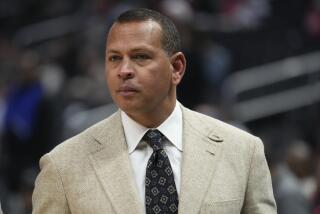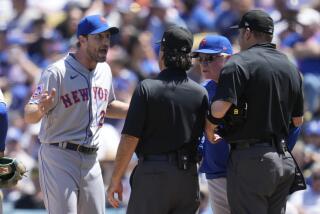Rozelle Discloses Plan for Random Drug Tests in NFL
- Share via
THE PROPOSAL
The program outlined by Commissioner Pete Rozelle includes two random tests during the season. A drug test will continue to be administered during training camp physical exams. Players testing positive for drugs three times will be banned from the league for a minimum of one year.
National Football League Commissioner Pete Rozelle Monday unveiled a comprehensive and controversial plan to combat drug abuse among professional football players--a plan that would include two unscheduled drug tests for every player during the regular season in addition to tests now given at training camps.
It was a move that Rozelle has been foreshadowing for several months. Rozelle has said he would have a tough drug-testing program in place before the 28 National Football League teams play another game.
When he announced it Monday, Rozelle broke new ground. The random drug tests will be the first conducted by a professional sports league. Some professional sports require mandatory drug tests, but none test unannounced.
“We’ll require two unscheduled tests for every NFL player during the regular season,” Rozelle said at his New York office in presenting a seven-step drug program that would cost an estimated $1 million annually.
Seventy percent of the NFL Players Assn. oppose the idea of mandatory testing.
NFLPA Executive Director Gene Upshaw said the players will not abide by Rozelle’s ruling, saying it represents an unauthorized change in the current collective bargaining agreement.
In a statement released in Washington, Upshaw said the union would be willing to meet with Jack Donlan, executive director of the NFL Management Council, to discuss possible changes in the current drug testing program.
“The bargaining agreement we reached with the owners in 1982 is final and binding on all parties and cannot be changed in mid-term except by mutual consent,” Upshaw said.
In that agreement, which extends through the 1986 season, the owners and players set up a drug program similar to the one Rozelle proposed Monday, except that it excludes random tests. Rozelle’s plan would come into effect with training camps this summer.
Rozelle, aware of NFLPA opposition to his plan, sought to ground it in a legal premise that he believes will stand up in court.
“The bargaining agreement and the (NFL) constitution and bylaws give me the authority to protect the health and welfare of the players and preserve the integrity of and the public’s confidence in the NFL,” he said.
Upshaw dissented vigorously.
“We cannot agree that Rozelle has the authority to unilaterally change the terms of our agreement,” Upshaw said.
A previous drug program, worked out in the collective bargaining agreement of 1982, allowed a test as part of training camp physical exams and again only if the team doctor found reasonable cause.
Under Rozelle’s new program, drugs to be tested for will include cocaine, marijuana, opiates, PCP, amphetamines and alcohol. The commissioner said alcohol will not be prohibited, but high levels of it and other indications of alcohol problems will lead to treatment and possible discipline.
Other points in Rozelle’s program:
--All users of prohibited substances will be placed under medical care as soon as identified through positive tests.
--A set of procedures will be established that will ensure confidentiality of the test results.
--In some cases, players who test positive will be removed immediately from their team’s active rosters and in extreme cases they could be banned permanently from the league.
A suspended or banned player would have an opportunity to appeal and have a hearing before Rozelle. Banned players may apply for reinstatement after one year.
--As much as possible, remove the league office and member clubs from the administration of the testing and treatment aspects of the program.
--Retain SmithKline Bio-Science Laboratories to collect and analyze all specimens. SmithKline is a nationwide network of laboratories.
--Assign Dr. Forest Tennant Jr., and SmithKline the responsibility of administering urine testing of draft-eligible college player at the annual timing and testing sessions.
The NFLPA is considering various legal responses, Upshaw said, but it may not make any. Among the options open to the players’ group is filing a grievance with the National Labor Relations Board.
Instead, it may simply follow the procedure recommended recently by its new president, offensive tackle Marvin Powell of the Tampa Bay Buccaneers.
“A big majority of the players are against random testing,” Powell said. “If the league tries to impose it, we’ll stand on a bargaining agreement with them that is perfectly valid and simply decline.”
Neither the players nor Rozelle would comment on what will become of players who refuse to take the tests.
This same issue has been the sticking point on player-owner negotiations in many sports for several years. In baseball, the players have said a compromise on mandatory random drug testing is a contradiction in terms.
Debating the idea, a players’ group and a baseball owners’ group have made no progress for more than a year.
Significantly, baseball commissioner Peter Ueberroth has never sought to impose a compulsory plan.
And in a recent interview, the president of the American League, Dr. Bobby Brown, indicated that mandatory random tests are probably illegal under the U.S. Constitution.
“The individual has a right not to be tested without his permission,” said Brown, a medical doctor. “The patient always has that right. But the drug problem today is extremely serious. When it’s as serious as it is, my hope is that the (players) will waive their rights.”
Baseball is making its pitch to the players on this level. It is trying to persuade them to submit to voluntary testing. And in their long-term contracts, many baseball players have so agreed.
In their approach to drugs, the difference between the two sports is this:
--Ueberroth, Brown and other baseball leaders see it as an educational issue.
--Rozelle sees it as a mandatory issue.
“Whether or not they know it, the players are role models,” Rozelle said.
Commenting on this statement, which Rozelle has made before, Upshaw said the other day: “There are a lot of role models, but we’re the only ones they (the owners) are talking about testing.”
More to Read
Go beyond the scoreboard
Get the latest on L.A.'s teams in the daily Sports Report newsletter.
You may occasionally receive promotional content from the Los Angeles Times.











